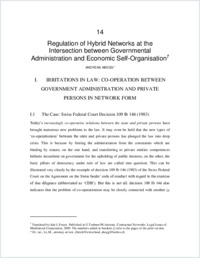Regulation of Hybrid Networks at the Intersection between Governmental Administration and Economic Self-Organisation
- Abegg, Andreas Universität Freiburg
-
2009
Published in:
- Contractual Networks: Legal Issues of Multilateral Cooperation / Teubner, Gunther ; Amstutz, Marc. - 2009, p. 255-289
English
Today’s increasingly co-operative relations between the state and private persons have brought numerous new problems to the law. It may even be held that the new types of ‘co-operationism’ between the state and private persons has plunged the law into deep crisis. This is because by freeing the administration from the constraints which are binding by statute, on the one hand, and transferring to private entities competences hitherto incumbent on government for the upholding of public interests, on the other, the basic pillars of democracy under rule of law are called into question. This can be illustrated very clearly by the example of decision 109 Ib 146 (1983) of the Swiss Federal Court on the Agreement on the Swiss banks’ code of conduct with regard to the exercise of due diligence (abbreviated as ‘CDB’). But this is not all: decision 109 Ib 146 also indicates that the problem of co-operationism may be closely connected with another new sort of phenomenon which is increasingly irritating the law: the organisational form of the network.
- Faculty
- Faculté de droit
- Language
-
- English
- Classification
- Law, jurisprudence
- License
-
License undefined
- Identifiers
-
- RERO DOC 12786
- DOI 10.5040/9781472560452.ch-014
- Persistent URL
- https://folia.unifr.ch/unifr/documents/301463
Statistics
Document views: 106
File downloads:
- Texte intégral: 150
